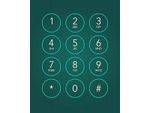Difference between revisions of "Portal:Mathematics"
| Line 19: | Line 19: | ||
|} | |} | ||
<br> | <br> | ||
| − | <div style="clear:both; width: | + | <div style="clear:both; width:100%"> |
{{{{FULLPAGENAME}}/box-header|<big>{{PAGENAME}}</big>|{{FULLPAGENAME}}/Introduction|}} | {{{{FULLPAGENAME}}/box-header|<big>{{PAGENAME}}</big>|{{FULLPAGENAME}}/Introduction|}} | ||
Revision as of 06:32, 22 July 2014
Mathematics
Mathematics is a language - many mathematicians have described the process of mathematics as art and poetry. Bertrand Russell once wrote, “Mathematics possesses not only truth but supreme beauty, a beauty cold and austere, like that of sculpture, sublimely pure and capable of a stern perfection, such as only the greatest art can show.” Other mathematicians and scientists have often written about the unreasonable effectiveness of mathematics in explaining the world around. Notwithstanding the poetry and the beauty, a functional knowledge of mathematics and computing is an essential skill for transacting in society.
However, to appreciate the poetry of this language or to transact, one must learn the grammar and acquire the vocabulary. And school mathematics is largely about acquiring the skills to communicate and develop the love for the language. This portal is for students and teachers to engage with this language and build those skills.
Interesting news
If mathematics is a language, then how does it seem to describe all the observed things in the universe from helical DNA structures to black holes. Mathematicians and scientists have talked about the unreasonable effectiveness of mathematics. So is mathematics inherent in the universe or is it part of the way the human brain is wired? This question is being studied and some recent research can be accessed here.
Articles by Teachers
National Conference on "Developing Mathematics Teachers for Quality Learning for All" was organized on Dec 20-22 at Regional Institute of Education, Ajmer. Praveen Sir from Kolar district participated and made a poster presentation on the use of Origami for mathematics teaching.
He has shared: "I got a great opportunity to represent my state/school to the entire country through a confrence called National Conference on Teachers of Mathematics Quality Learning for all. Out of 120 papers recieved, only 70 were selected to present. I was forutnate enough to be one of 70s. I presented a poster on ORIGAMI. Very few people knew ORIgami there. That mae my poster very special.I presenter the poster on the topic : "teaching of geometry using origami in the class room." I could able to present 10 posters on the topic and also demonstrated several 2-d, 3-d objects. Mine was not like the other lectures. Even the convener appreciated the action of Origami."
See pictures below.
Famous Mathematicians
Here is a video on Srinivasa Ramanujam and his magic square shared by Sunitha Madam.
Events and Happenings
“Understanding the relationships between different forms of mathematical knowledge (out of school) and school mathematical knowledge ” - Researcher: Bindu Thirumalai - September 5, 2013
Book Shelf
A School Geometry By Hall and Stevens. Must read book for all the math teachers. Costs only Rs80 and is available through Flipcart and infibeam.
Maths Lab
Fun corner

|
YOUR PHONE NUMBER WILL REVEAL YOUR AGE |
Your Phone number will reveal your actual Age. It will take about 15 seconds,read and do it at the same time so that you will not lose the fun.
- Take a look at your last digit of your cell phone number
- Use this figure and multiply by 2
- Then add 5
- And then multiply by 50
- And then add the number 1765
- The last step; with this number, subtract your birth year.
Now you see a three-digit number. The first digit is the last digit of your phone number, the next two digits are your actual age! You can use the attached spreadsheet to solve this and find out why it works!!
Categories
Topics
Classroom resources
Find here mind maps, activities, video and multimedia resources for science lessons in Class 9.The resources have been developed to help build conceptual understanding and have been arranged according to the chapters in the textbook.Mathematics foundational materials please Click here
For typing formula on KOER, please click here.
For Question papers and CCE activities please click here
For solved problems please click here
For additional resources and teaching activities click below:
- Permutations and Combinations
- Progressions
- Graphs And Polyhedra
- Probability
- Polynomials
- Sets
- Activity for Co-ordinate Geometry
- Mensuration
- Trigonometry
- Simultaneous_Linear_Equations
- Triangles
- Congruence of Triangles
- Similar Triangles
- Concurrency in triangles
- Quadrilaterals
- Circles
- Circles Chord Properties
- Circles Tangent Properties
From the forum
Some interesting exchanges from the STF mailing forum.
To join the forum, visit this group here.
Square root of a number
The squre root of whole number is always less than the that square number ( ex; sqare root of 25 is 5, 36 is 6 etc) but in decimal it is reverse (ex; sqare root 0.8 is o.89) what is the reason? Shared by Suchetha SS, GHS Thyamagondulu.
CarMetal is a Geogebra like free software
A description of another graphic tool like Geogebra. Shared by Tharanath Achar, GPUC Belthangady.
Math teaser about an arithmetic progression
P th term of an AP is Q and Q th term of an AP is P . Then find PQ th term ?....Shared by Mallikarjun Sudi, GHS Yelheri and Sneha Titus, APU. [Read More]
Pi Day
Which day is Pi Day? [Find out]
Trigonometry using Geogebra
Basics of Trigonometry using Geogebra, lesson shared by Radha Narve, GHS Begur. Click [here] to read more.
Spotlight
- Check out this online geometry box that you can use to show constructions for students. This tool can also be downloaded. The tool requires flash player. Click here to view.
- UNESCO article on a Maths teachers community of learning

